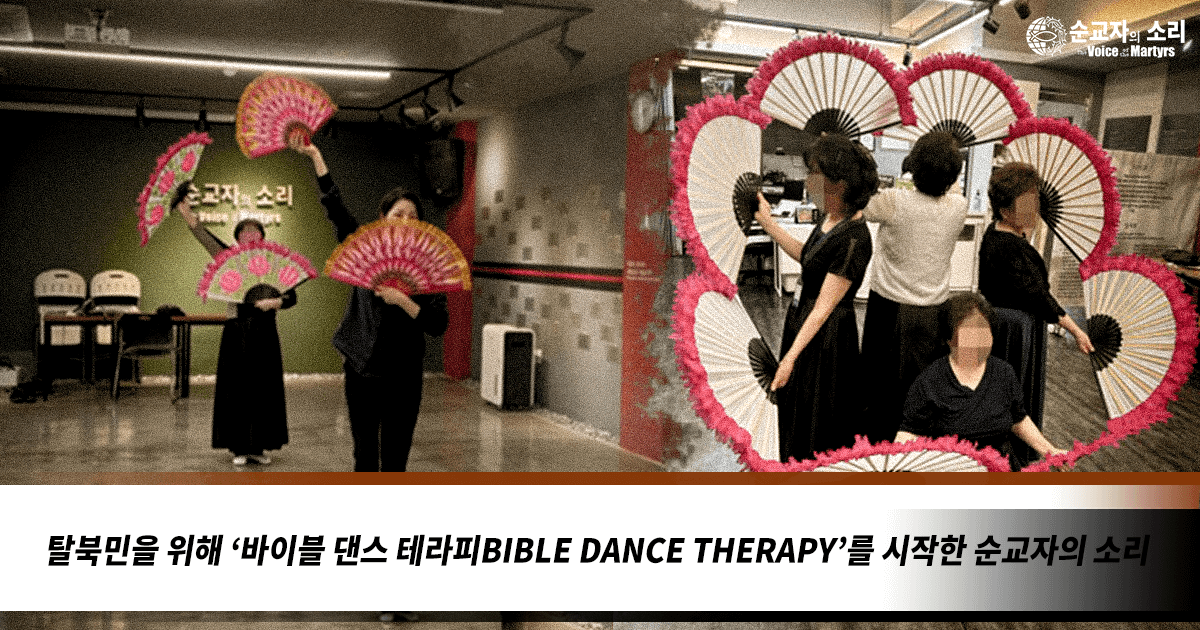
«ГОЛОС МУЧЕНИКОВ» ПРОВОДИТ БИБЛЕЙСКУЮ ТАНЦЕВАЛЬНУЮ ТЕРАПИЮ ДЛЯ СЕВЕРОКОРЕЙЦЕВ
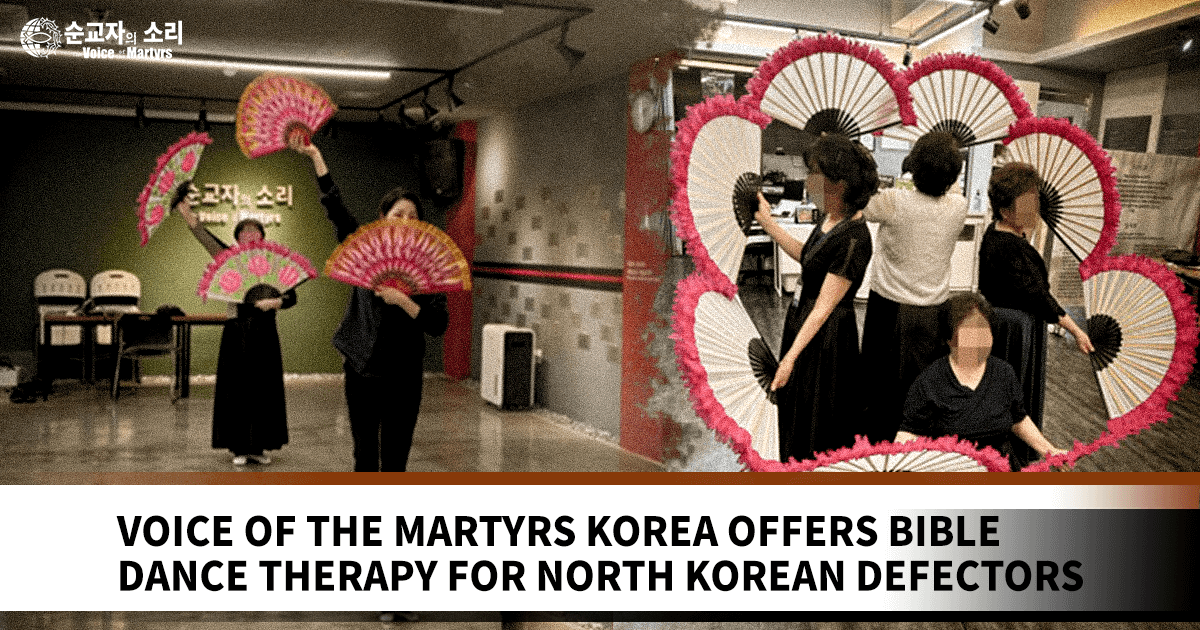
Voice of the Martyrs Korea recently began a Bible Dance Therapy class for North Korean defectors enrolled in its Underground Technology discipleship training school. Voice of the Martyrs Korea Representative Dr. Hyun Sook Foley, a former student of famed Korean traditional dancer Lee Mae Bang, is the instructor. She explains why she created the class and why it is having such a significant impact on the students.
“There are three complex issues which North Korean defectors face when adjusting to life in South Korea which have particularly stood out to us in relation to their discipleship,” says Representative Foley:
“First, North Koreans struggle to adapt to Christianity in South Korea because the South Korean approach to Christianity requires a South Korean cultural and linguistic base which North Koreans do not have. This problem presents itself most clearly in the preaching and reading of the Bible because the South Korean Bible was translated by and for South Korean scholars, not ordinary Koreans.”
“Second, North Koreans struggle to adapt to social life in South Korea because the social life they are accustomed to in North Korea is communal in nature. It involves eating, singing, and dancing together with one’s neighbors. But South Koreans tend to form their social life on the basis of preference, convenience, and privacy. For these reasons, it is less common for South Koreans to form relationships with neighbors or invite people into their homes. This can contribute to North Koreans feeling depressed, as their main method of giving and receiving relational support does not work in South Korea.”
“Third, many North Koreans suffer from trauma, depression, and related mental health issues. The main support which the government provides for them to help them treat this aspect of their settlement in South Korea is financial coverage for antipsychotic, antidepressant, and sleep medication prescriptions. While this medication may help them to bring their mental health issues under control, many of them report the persistence of symptoms and develop dependence and tolerance to the medication.”
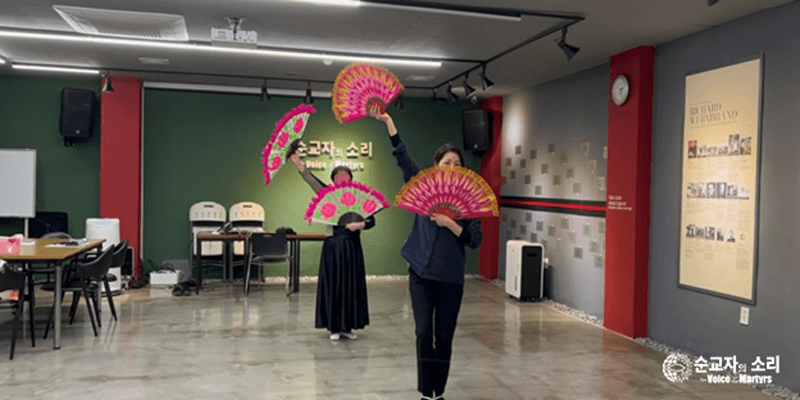
Dr. Foley leads an individual Bible Dance Therapy session with a North Korean defector student.
Representative Foley says the creative answer to these three problems is what she calls “Bible Dance Therapy”. She explains why she uses each of the words in the class title.
“The first word is ‘Bible’,” says Representative Foley. “Voice of the Martyrs Korea has been helping North Koreans to see that the John Ross Bible translation, the first translation of the Bible into the Korean language, was translated by North Koreans. Although the Bible in widest usage among Koreans today is South Korean-centered and scholastic, it has not always been so. When North Koreans learn about the history of the Bible in Korea, they uncover that the faith and practices of the North Korean underground church are the oldest and best-established form of Christian faith in Korea. This encourages them greatly.”
“The second word is ‘Dance’,” says Representative Foley. “If you give North Koreans music and a wide-open space, they know what to do and are happy to do it. Dance has been a formative part of most of their lives up until their arrival in South Korea. In South Korea, dance is relegated to the studios and to the clubs and is not commonly practiced as a recreational communal activity in the lives of ordinary people. Giving North Koreans space and occasion to dance helps them to maintain a healthy communal life that is native to them.”
“The third word is ‘Therapy’,” says Representative Foley. “Dance therapy provides an alternative form of dealing with trauma, depression, and other mental health issues for North Koreans whose main form of handling these issues, medication, has been largely ineffective until this point.”
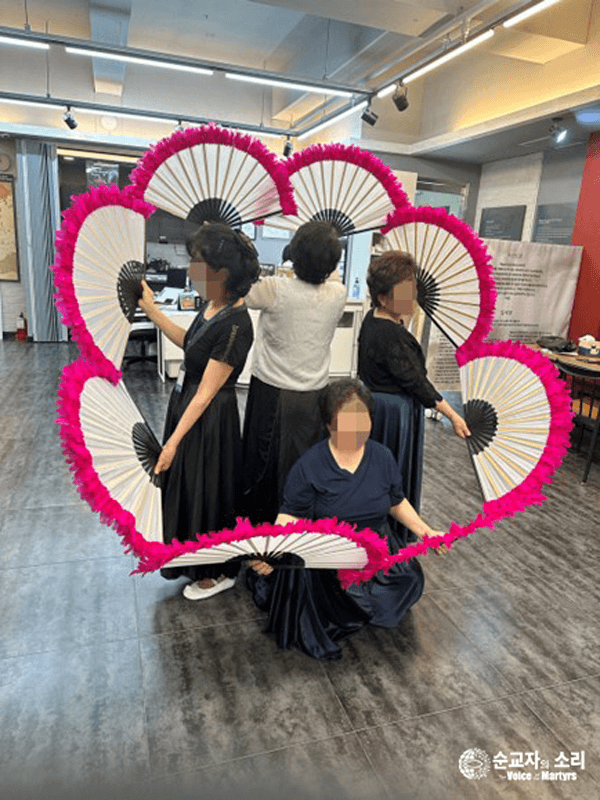
Students in the Bible Dance Therapy class practice the fan dance.
“Bible Dance Therapy then encompasses all of these things in its focus,” says Representative Foley. “It serves to help North Koreans to overcome trauma and mental health issues through learning about and expressing the history of the Korean Bible through dance.”
Currently 6 students are participating in the program. Representative Foley says she intentionally keeps the enrollment small due to the amount of individual work required with each student. “I teach the students as a group the movements that compose several basic traditional Korean dances, and then I work with them individually to develop their own dances to work through their traumas and difficulties,” says Representative Foley.
One of the students, Mrs. K (name withheld for security reasons), suffered the death of her young child due to cannibalism at the hands of neighbors during North Korea’s “Arduous March” famine in the 1990s. Unable to sleep despite heavy medication, Mrs. K came to the Bible Dance Therapy class at the urging of a fellow student. Representative Foley says that Mrs. K has been among the best dancers, with her dance routine a favorite among the other students. “She’s experienced a kind of healing that can’t come from medicines,” says Representative Foley.
Representative Foley says that through Bible dance therapy, North Korean students are learning that they don’t need to become more South Korean culturally in order to become Christian. Mrs. J (name withheld for security reasons), one of the Bible Dance Therapy students, has been learning that the Bible did not first come to South Korea, but to North Korea. “I thought that South Korea had the history of Christianity,” says Mrs. Jang. “But, through the Bible Dance Therapy class, that idea was broken. I got to know about Missionary Robert Thomas [one of the first missionaries to Korea, martyred near Pyongyang] and learned about how the Bible first came to Korea.”
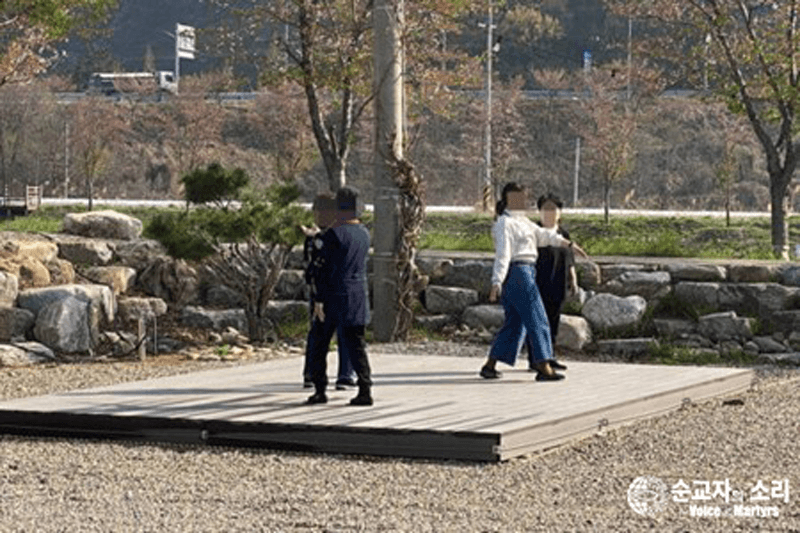
North Korean defector Bible Dance Therapy students practice at a “wide open space”—a campsite.
Upon learning about these things, Mrs. Jang says, “I am so happy and excited that we have come to know Jesus Christ through the dedication and service of our missionaries. I don’t want to imagine what would have happened to me if I did not know Jesus Christ. Through the martyrdom of missionaries like Robert Thomas, many North Korean women were able to share Jesus, and now I am able to meet Jesus and share the gospel.”
Representative Foley says that the students have decided to do a public performance in October, but additional help will be needed from volunteers in order to make that a reality. “We need a donated space where we can perform, with lights and sound equipment,” she says. She is also hoping that Korean Christians with gifts in performing traditional Korean instruments will come forward to volunteer their services to help. “It is a pioneering effort,” says Representative Foley. “We began because we saw that the need for this kind of therapeutic activity was so great for North Korean defectors. But I am only one dancer. There is a need for many Korean Christians to aid us in this effort.”
Individuals interested in learning more about Voice of the Martyrs Korea’s North Korean ministry can visit https://vomkorea.com/en/northkorea/. Korean Christians with gifts in traditional Korean dance and music can contact the ministry at 02-2065-0703 for more information about volunteering.

